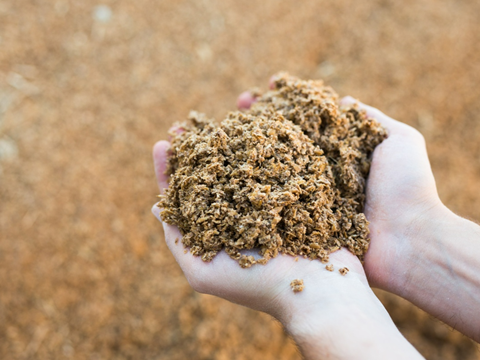
Involving 14 partners from 8 countries, the POLYMEER project has officially begun, aiming to convert wet brewers’ spent grain (BSG) into high added value materials and diversify the range of material solutions capable of replacing traditional plastics.
Funded by the Circular Bio-Based Europe Joint Undertaking HORIZON programme, it is due to run for 48 months from the 1st September 2024. The project has received 4.9M€ in funding and is coordinated by Università degli Studi di Perugia (UNIPG).
POLYMEER aims to develop new bio-based polymers, copolymers and polymer blends based on BSG, utilizing ‘green, waste-minimized’ processes. Apparently, the materials will undergo precise chemical design to meet a specific set of properties for three targeted applications: mulch films suitable for agricultural use, textiles for the automotive industry, and tertiary packaging films for industrial purposes. All products will be designed to be recycled and/or biodegraded in specific environments.
The project will focus on optimizing the conversion of BSG into bio-based ‘building blocks’, targeting the creation of high-performance bioplastics that can compete with conventional materials. It also plans to assess the life cycle sustainability, cost-effectiveness, and scalability of these solutions, while engaging key stakeholders to ensure market readiness and regulatory compliance.
To achieve the project’s goals over the next four years, UNIPG says it will work with an international consortium including academic institutions, research centres, and companies from 8 countries: Italy (Università degli Studi di Perugia, Università degli Studi di Roma La Sapienza, Next Technology Tecnotessile, Birra Peroni), Belgium (Bio-Base Europe Pilot Plant, Zabala Brussels, Normec OWS), Spain (Lomartov, Aimplas), Croatia (Bio-mi), Netherlands (Universiteit Twente), Portugal (Borgstena), and Denmark (Gate2Growth).
In April, Circular Bio-based Europe Joint Undertaking (CBE JU) opened a call for project proposals in a bid to stimulate a circular economy for biobased materials in Europe, offering a total of €213 million to eighteen successful applicants. The call budget intended to support the scaling up of technologies in pursuit of industrial deployment, and boost investment and job creation at regional and local levels.
AIMPLAS announced its participation in the EU-funded SYMBA project in the same month, hoping to using AI-driven solutions to promote circular economy principles within the biobased industrial ecosystem. Focusing on the development of a unique Industrial Symbiosis (IS) methodology specifically tailored to local and regional biobased ecosystems, SYMBA plans to implement a user-friendly AI database suggesting regional IS innovative processes to create zero-waste value chains.
If you liked this story, you might also enjoy:
The ultimate guide to the Packaging and Packaging Waste Regulation in 2024
How are the top brands progressing on packaging sustainability?
Sustainable Innovation Report 2024: Current trends and future priorities
Everything you need to know about global plastic sustainability regulation














No comments yet